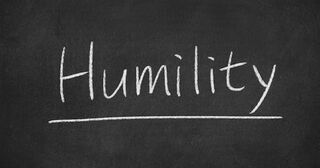Coronavirus Disease 2019
How Intellectual Humility Relates to Attitudes About Vaccines
IH is associated with more favorable vaccine attitudes and intentions.
Posted March 31, 2021 Reviewed by Matt Huston
Key points
- Intellectual humility is the tendency to acknowledge that one’s views may be incorrect and remain open to alternative ones.
- Across two studies, intellectual humility was negatively related to anti-vaccination attitudes.
- Intellectual humility was positively related to intentions to receive the COVID-19 vaccine.

Understanding the psychology of vaccination attitudes is arguably more important now than ever. After a year, the world is still grappling with the COVID-19 virus, and vaccinations are one of the most promising avenues for reducing the spread of most if not all viruses.
There are several factors that scholars consider in the domain of vaccination attitudes, our web of beliefs related to trust in medical professionals, fears about vaccine side effects, support for vaccination, preferences for natural immunity, and concerns about the pharmaceutical industry. Among these factors are demographic characteristics and level of scientific knowledge. Recently, scholars have also considered individual differences in personality traits and cognitive styles that might reduce negative attitudes toward vaccines.
Why Consider the Role of Intellectual Humility in Vaccine Attitudes?
Intellectual humility (IH)—which refers to the tendency to acknowledge that one’s views may be incorrect and remain open to alternative perspectives—may contribute to viewing vaccinations in a more favorable light. First, IH is related to cognitive ability, including general intelligence, cognitive reflection, and science literacy. As such, IH may be related to holding more accurate views of vaccines and thus lead individuals to hold more supportive views of them.
In addition, IH is related to holding beliefs gently rather than dogmatically. Intellectually humble individuals are able to separate their identities from their beliefs. As a result, disconfirmatory information (information that challenges one's beliefs) is less threatening and distressing and instead can be approached with curiosity and genuine interest. Indeed, IH is related to seeking out disconfirmatory political information and a desire to learn more about one’s mistakes on performance-based tasks.
Intellectual Humility May Promote Favorable Vaccine Attitudes
Two recently published academic articles examined the relations between IH and vaccination attitudes in community samples. In both studies, IH was negatively related to anti-vaccination attitudes (i.e., IH is related to holding more favorable views of vaccines). Importantly, in one study, the authors examined whether these results remained significant even when statistically accounting for potential confounds, such as demographic characteristics and political ideology. IH remained a significant predictor of less agreement with anti-vaccination attitudes after controlling for these factors.

In the first of these two studies, the relations between IH and intentions to receive the influenza vaccine were examined. Perhaps surprisingly, given the negative correlations between IH and anti-vaccination attitudes, IH was not significantly related to intentions to receive the flu vaccine. Intentions to vaccinate are robustly linked with actual vaccination behaviors; hence, these results raise the possibility that IH may not translate to vaccination behaviors.
That being said, in the second study, the relations between IH and intentions to receive the COVID-19 vaccine were examined. In contrast with the first study, IH was significantly, positively related to intentions to receive the COVID-19 vaccine. Thus, intellectually humble individuals may be more likely to actually take the steps necessary to get the COVID-19 vaccine compared with less intellectually humble individuals. Of course, this claim is speculative given the lack of causal data and direct examination of vaccine behaviors.
How do we make sense of the discrepancy between the two studies in terms of vaccination intentions? First, it is possible that people differentially interpret the importance of influenza vaccines and COVID-19 vaccines. Perhaps people, even intellectually humble individuals, do not consistently feel a need to obtain an influenza vaccine whereas people may feel an urgent desire to obtain the COVID-19 vaccine given strict lockdown and quarantine regulations. It is also possible that the timing of surveys matters. Specifically, the first study on influenza vaccines was conducted outside of peak flu season; consistent with the availability and representativeness heuristics, flu may not have been on the forefront of peoples’ minds. The second study was conducted during the height of the COVID-19 pandemic, perhaps making vaccination intentions all the more salient.

Next Steps in This Line of Research
In future research, it will be critical to ascertain whether and to what extent IH causes individuals to hold more favorable vaccine attitudes and intentions to vaccinate. All data thus far are correlational, meaning we cannot draw causal conclusions from them. It is possible that other variables related to IH, such as low dogmatism or high science literacy, drive the relations between IH and vaccination attitudes. If that is the case, then attempting to increase IH to promote positive attitudes toward vaccines may prove fruitless. If, however, IH does indeed cause individuals to hold more favorable vaccine attitudes, then identifying (a) how it can be increased and (b) when in development it is easiest to boost would both be key future directions.
In sum, IH is not just a construct with philosophical implications. Instead, IH may be a construct of considerable practical utility. It has the potential to influence political and religious attitudes, critical thinking and decision-making, and possibly health-related behaviors as well.
References
Huynh, H. P., & Senger, A. R. (2021). A little shot of humility: Intellectual humility predicts vaccination attitudes and intention to vaccinate against COVID‐19. Journal of Applied Social Psychology.
Senger, A. R., & Huynh, H. P. (2020). Intellectual humility’s association with vaccine attitudes and intentions. Psychology, Health & Medicine.


